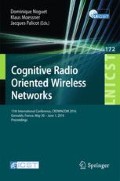Abstract
In wireless communication systems, high-power transmitters suffer from nonlinearities due to power amplifier (PA) characteristics, I/Q imbalance, and local oscillator (LO) leakage. Digital Predistortion (DPD) is an effective technique to counteract these impairments. To help maximize agility in cognitive radio systems, it is important to investigate dynamically reconfigurable DPD systems that are adaptive to changes in the employed modulation schemes and operational constraints. To help maximize effectiveness, such reconfiguration should be performed based on multidimensional operational criteria. With this motivation, we develop in this paper a novel evolutionary algorithm framework for multiobjective optimization of DPD systems. We demonstrate our framework by applying it to develop an adaptive DPD architecture, called the adaptive, dataflow-based DPD architecture (ADDA), where Pareto-optimized DPD parameters are derived subject to multidimensional constraints to support efficient predistortion across time-varying operational requirements and modulation schemes. Through extensive simulation results, we demonstrate the effectiveness of our proposed multiobjective optimization framework in deriving efficient DPD configurations for run-time adaptation.
Access this chapter
Tax calculation will be finalised at checkout
Purchases are for personal use only
References
Anttila, L., Händel, P., Valkama, M.: Joint mitigation of power amplifier and I/Q modulator impairments in broadband direct-conversion transmitters. IEEE Transactions on Microwave Theory and Techniques 58(4), 730–739 (2010)
Çiflikli, C., Yapící, A.: Genetic algorithm optimization of a hybrid analog/digital predistorter for RF power amplifiers. Analog Integrated Circuits and Signal Processing 52(1), 25–30 (2007)
Ding, L., et al.: Compensation of frequency-dependent gain/phase imbalance in predistortion linearization systems. IEEE Transactions on Circuits and Systems I: Regular Papers 55(1), 390–397 (2008)
Ghazi, A., et al.: Low power implementation of digital predistortion filter ona heterogeneous application specific multiprocessor.In: Proceedings of the International Conference on Acoustics, Speech,and Signal Processing, pp. 8391–8395. Florence, Italy (2014)
Hilborn, D.S., Stapleton, S.P., Cavers, J.K.: An adaptive direct conversion transmitter. IEEE Transactions on Vehicular Technology 43(2), 223–233 (1994)
Llamocca, D., Pattichis, M.: Dynamic energy, performance, and accuracy optimization and management using automatically generated constraints for separable 2D FIR filtering for digital video processing. Transactions on Reconfigurable Technology and Systems 7(4). Article No. 31(2015)
Nizamuddin, M.: Predistortion for nonlinear power amplifiers with memory. Ph.D. thesis, Virginia Polytechnic Institute and State University (2002)
Shen, C., Plishker, W., Wu, H., Bhattacharyya, S.S.: A lightweight dataflow approach for design and implementation of SDR systems. In: Proceedings of the Wireless Innovation Conference and Product Exposition (2010)
Sills, J.A., Sperlich, R.: Adaptive power amplifier linearization by digital pre-distortion using genetic algorithms. In: Proceedings of the Radio and Wireless Conference, pp. 229–232 (2002)
Sindhya, K., Miettinen, K., Deb, K.: A hybrid framework for evolutionary multi-objective optimization. IEEE Transactions on Evolutionary Computation 17(4), 495–511 (2013)
Wang, L.H., et al.: Dataflow modeling and design for cognitive radio networks. In: Proceedings of the International Conference on Cognitive Radio Oriented Wireless Networks, pp. 196–201 (2013)
Zitzler, E.: Evolutionary algorithms for multiobjective optimization: Methods and applications. Ph.D. thesis, Swiss Federal Institute of Technology (ETH) Zurich (1999)
Acknowledgements
This research was supported in part by Tekes, the Finnish Funding Agency for Innovation; and the U.S. National Science Foundation.
Author information
Authors and Affiliations
Corresponding author
Editor information
Editors and Affiliations
Rights and permissions
Copyright information
© 2016 ICST Institute for Computer Sciences, Social Informatics and Telecommunications Engineering
About this paper
Cite this paper
Li, L., Ghazi, A., Boutellier, J., Anttila, L., Valkama, M., Bhattacharyya, S.S. (2016). Evolutionary Multiobjective Optimization for Digital Predistortion Architectures. In: Noguet, D., Moessner, K., Palicot, J. (eds) Cognitive Radio Oriented Wireless Networks. CrownCom 2016. Lecture Notes of the Institute for Computer Sciences, Social Informatics and Telecommunications Engineering, vol 172. Springer, Cham. https://doi.org/10.1007/978-3-319-40352-6_41
Download citation
DOI: https://doi.org/10.1007/978-3-319-40352-6_41
Published:
Publisher Name: Springer, Cham
Print ISBN: 978-3-319-40351-9
Online ISBN: 978-3-319-40352-6
eBook Packages: Computer ScienceComputer Science (R0)

